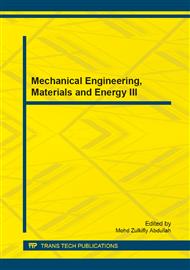[1]
E. Demeulemeester, W. Herroelen. A branch and bound procedure for the Multiple Resource Constrained Project Scheduling Problem, Management Science, vol. 38, 1992, pp.1803-1818.
DOI: 10.1287/mnsc.38.12.1803
Google Scholar
[2]
A. Viana, J. Pinho, D. Sousa. Using metaheuristics in mulitiobjective resource constrained project scheduling, European Journal of Operational Research, vol. 120, 2000, pp.359-374.
DOI: 10.1016/s0377-2217(99)00163-0
Google Scholar
[3]
M. Mori, C. C. Tseng. A genetic algorithm for multi-mode resource constrained project scheduling problem, European Journal of Operational Research, vol. 100, 1997, pp.134-141.
DOI: 10.1016/s0377-2217(96)00180-4
Google Scholar
[4]
T. Yang, C. Chang. Stochastic resource-constrained scheduling for repetitive construction projects with uncertain supply of resources and funding,. International Journal of Project Management, vol. 23, 2005, pp.546-553.
DOI: 10.1016/j.ijproman.2005.03.003
Google Scholar
[5]
J. Xiong, Y. Chen, K. Yang, et al. A hybrid multiobjective genetic algorithm for robust resource-constrained project scheduling with stochastic durations, Mathematical Problems in Engineering, 2012, pp.1-22.
DOI: 10.1155/2012/786923
Google Scholar
[6]
D Golenko—Ginzburg, A Gonik. A heuristic for network project scheduling with random activity durations depending on the resource allocation, International Journal of Production Research, vol. 55, 1998, pp.149-162.
DOI: 10.1016/s0925-5273(98)00044-9
Google Scholar
[7]
E. Rosenblueth. Two-point estimates in probabilities, Applied Mathematical Modelling, vol. 5, 1981, pp.329-335.
DOI: 10.1016/s0307-904x(81)80054-6
Google Scholar
[8]
K R Maccrimmon, C A Ryavec. Analytical study of the PERT assumptions, Operations Research, vol. 12, 1964, pp.16-36.
DOI: 10.1287/opre.12.1.16
Google Scholar
[9]
G. Verbic, C. A. Canizares. Probabilistic optimal power flow in electricity markets based on a two-point estimate method, IEEE Transactions on Power System, vol. 21, 2006, pp.1883-1893.
DOI: 10.1109/tpwrs.2006.881146
Google Scholar
[10]
Tounsi. M, David.P. Local search algorithm to improve the local search, Tools with Artificial Intelligence, 2002, pp.438-443.
DOI: 10.1109/tai.2002.1180836
Google Scholar


